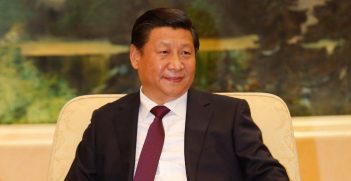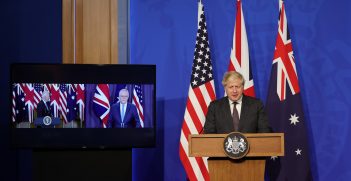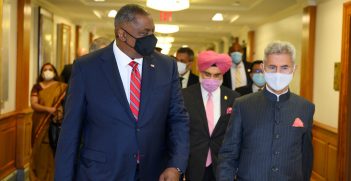Kishida’s State Visit to Washington: US-Japan alliance still the linchpin to Indo-Pacific Peace and Stability

The state visit of Japanese Prime Minister Kishida Fumio to the United States this week has been billed as a doubling down of Japan on the US Japan alliance. In reality, it is a continuation of the incremental and sustained investment in the bilateral relationship over decades to deal with regional and global security challenges.
Kishida joins a long line of prime ministers that have understood Japan’s independence and autonomy in the Indo-Pacific is intimately linked to a strong, robust, and wide ranging relationship with United States. Complementary to this relationship is the need to embed Japan within international institutions and multilateral bodies, and particularly the Comprehensive and Progressive Transpacific Partnership and the Regional Comprehensive Economic Partnership.
It is a misunderstanding to see Japan-US relations solely through the lens of the seven decades-plus long alliance. Japan enjoys deep, long-lasting and broad relationships with its American counterparts at the leadership level, within the Congress and Senate, and at universities where many Japanese Foreign Ministry officials are sent for public policy master degrees. Furthermore, there are long lasting, sustained exchanges between Self Defense Force officials and their US counterparts, think tanks, researchers, civil societies, and families due to immigration, marriages, and culture exchanges.
The US-Japan relationship is the model relationship, where bonds across a variety of sectors contributing to prosperity, peace, and stability, have been forged and sustained. Notwithstanding, Kishida’s visit to Washington comes at a time when international order is being challenged by global and regional disruptors.
Russia’s invasion of the Ukraine has clearly violated Article 2(4) of the UN Charter. Hamas’ attack on Israel and the Netanyahu government’s subsequent response has destabilized the Middle East and global supply chains. In the immediate geographic vicinity of Japan, China’s continued assertive behavior in the South China Sea, the Taiwan Strait, and in the East China Sea vis-a-vis the Senkaku Islands has created a worrisome atmosphere within the Indo-Pacific and in Japan in particular.
Kishida voiced these concerns in his speech at the 2020 June Shangri La dialogue, remaking that “today’s Ukraine can be tomorrow’s East Asia.” He further stated “that the world is now facing a historic turning point with Russia’s invasion of Ukraine, the Israeli-Palestinian conflict in the Middle East and the security environment in East Asia.” By working with like-minded countries built on the pillar of the US- Japan alliance, Japan wants to protect its national security through strengthening the US-Japan alliance and by building a latticework of minilateral relationships throughout the Indo-Pacific region. These are exemplified in the Quadrilateral Security Dialogue between the US, Australia, Japan and India, and also emerging new quadrilateral partnerships such as the Maritime Cooperative Activity between the US, Japan, Australia, and the Philippines – each in part seeking to deal with maritime tensions and reduce the revisionist influences of China in the South China Sea.
Japan is also investing in its security, with its revised 2022 National Security Strategy and associated documents, through the investment in counter strike capabilities, technologies, and partnerships. Japan hopes to send a message to rogue states such as North Korea that weapons of mass destruction and proliferation will not be tolerated within the region.
Tokyo also wants to deter Chinese assertive behaviour in the East China Sea and the Taiwan Strait. For Tokyo, the 5.5 trillion US dollars of trade that goes through the South China Sea and in and around the Taiwan Strait would be disrupted by a forced reunification with Taiwan. This would be an existential crisis for the Japanese economy and the Japanese state.
In order to secure its autonomy and independence from China, while at the same time enjoy the benefits having a strong and robust economic relationship with China, Japan has continued to invest in strengthening its security partnerships with like-minded countries like the US. This will include strengthening and diversifying the role of the Quad in stabilising the Indo-Pacific region to be a functional, ad hoc cooperative that deals with problems as they arise rather than affirm alliances based on military commitments to each other.
AUKUS represents another opportunity for Japan, in particular participating in the second pillar, which focuses on emerging technologies such as AI, quantum computing, hypersonic missile systems, the internet, and space technology. These emerging technologies will shape the relationship between the government and people. They will also influence and shape the evolution of the global and regional economies. Importantly, they represent the drivers of growth moving forward.
Japan seeks to expand on lateral relationships with its US partner in an effort to mitigate the manifold and various challenges represented in the Indo Pacific region and beyond. The recent quadrilateral partnership announced by Washington, Tokyo, Canberra, and Manila on maritime cooperation in the South China Sea is an example of the kind of cooperative multilateral relationships that Japan is investing in to secure its security, but also provide a public good to the region.
Similarly, the Camp David Principles-based trilateral between South Korea, Japan, and the United States deals with challenges associated with weapons proliferation on the Korean Peninsula, and how to strengthen and deepen the ability of these three countries to contribute to peace and security within the region.
Kishida’s visit to Washington comes at an important time for not only Japan but the United States and like-minded countries as authoritarian states and disruptors, such as Hamas, aim to fundamentally reshape international order in a way that suits their domestic political systems and political objectives. If successful, this will come at a cost for the US, Japan, and other like-minded countries.
Forging a multi-layered latticework of partnerships with its key ally the United States, and also with other key allies such as Australia, Canada, the EU, India, and Southeast Asian countries, Japan aims to entrench a rules-based international order whereupon internationally agreed upon rules shapes the behavior of great, middle ,and small size states.
Stephen Nagy is a Professor at the Department of Politics and International Studies at the International Christian University. Concurrently, he is a senior fellow at the MacDonald Laurier Institute (MLI), a senior fellow at the Asia Pacific Foundation, a fellow the Canadian Global Affairs Institute (CGAI), a senior fellow with the East Asia Security Centre (EASC), and a visiting fellow with the Japan Institute for International Affairs (JIIA). He also serves as the Director of Policy Studies for the Yokosuka Council of Asia-Pacific Studies (YCAPS) and a Governor for the Canadian Chamber of Commerce in Japan. Twitter handle: @nagystephen1.
This article is published under a Creative Commons Licence and may be republished with attribution.





